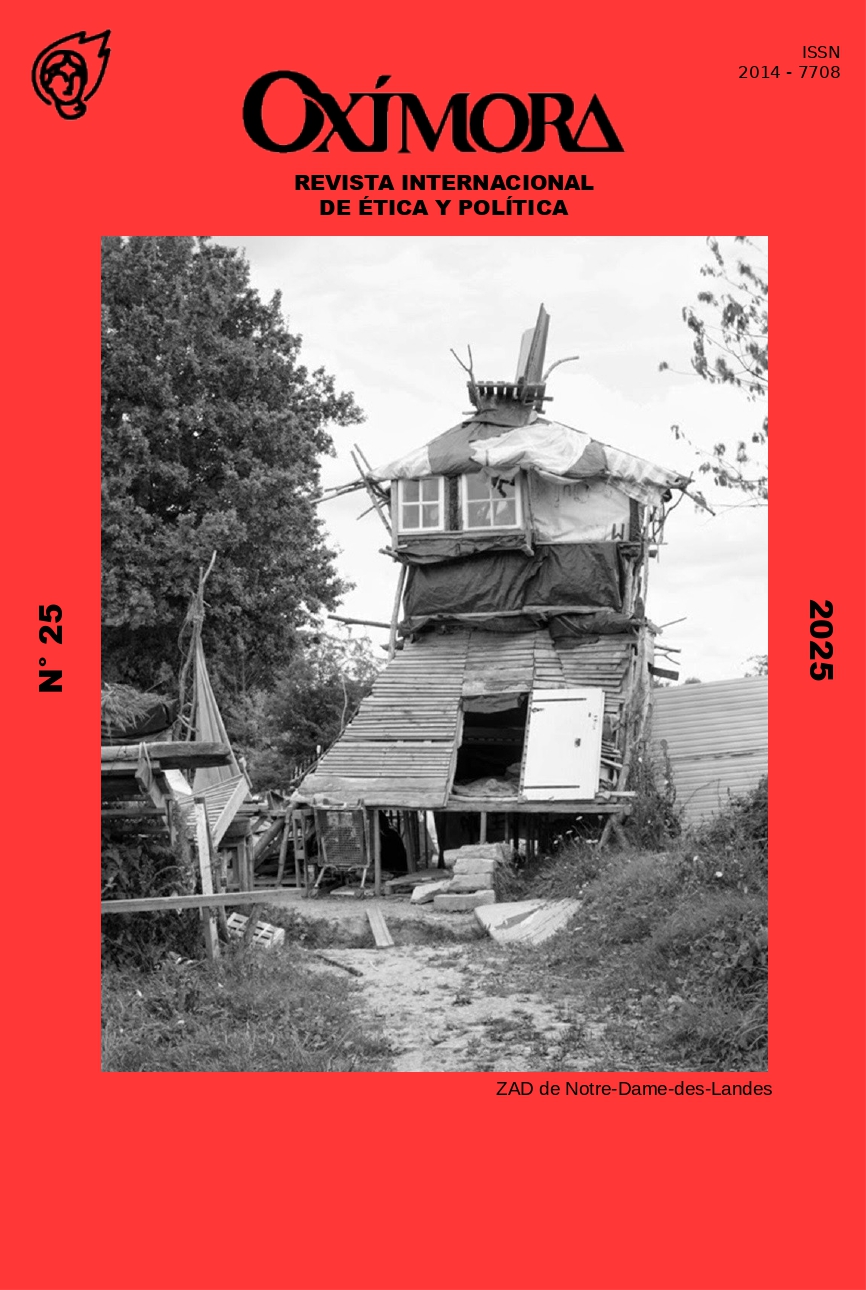The Impact of Post-Colonial Feminist Philosophy on Western Feminist Epistemology. A Dialogue Between Beauvoir and Mohanty
DOI:
https://doi.org/10.1344/oximora.25.2025.47786Keywords:
Epistemology, Feminism, Post-Colonial Feminism, Epistemological Colonialism, Beauvoir, MohantyAbstract
This essay seeks to analyze the impact of post-colonial feminist philosophy on Western feminist philosophy, through the epistemic categories of analysis, the concept of universality, objectivity and the epistemological model and the model of knowledge production. Thanks to Simone de Beauvoir's text, Deuxième sexe and Mohanty’s text Thirld World Woman, a dialogue is initiated on the category of "woman", over the production of this category as universal and objective, and the epistemological consequences of it. The aim of this essay is to argue how post-colonial feminist philosophy proposes an epistemological shift within the framework of traditional feminist philosophy, epistemology and knowledge production, by introducing new lines of research that redefine the Western paradigm and new methods in reference to the knowledge model.
References
Alexander, M. J., & Mohanty, C. T. (1997). Feminist Genealogies, Colonial Legacies, Democratic Futures (1st ed.). Routledge.
https://doi.org/10.4324/9780203724200
Beauvoir, S. de, López Pardina, T., & Martorell Linares, A. (1949). Ed. (2005) Beau-voir, Simone de, 1908-1986. (1949). [Deuxième sexe. Castellà] El segundo sexo (1a edición). Ediciones Cátedra.
Belle, K. S. (as Kathryn T. Gines). (2014). Comparative and Competing Frameworks of Oppression in Simone de Beauvoir’s The Second Sex, Graduate Faculty Phi-losophy Journal, Volume 35, Numbers 1–2.
Bergoffen, D. and Burke,M. (2023). Simone de Beauvoir, The Stanford Encyclope-dia of Philosophy (Spring 2023 Edition), Edward N. Zalta & Uri Nodelman (eds.), https://plato.stanford.edu/archives/spr2023/entries/beauvoir/
Broeck, S. (2011). Re-Reading de Beauvoir after Race: Woman-as-Slave Revisited. Intellect. International Journal of Francophone Studies 14(1):167–84.
Clavo Sebastián, M. J. (2010). Chandra Talpade Mohanty y su crítica al pensamiento feminista. A Miradas multidisplinares para un mundo en igualdad (p. 121–134). Universidad de La Rioja.
Falquet, J. (2017). Luchas (de)coloniales en torno al "territorio-cuerpo": de la guerra al extractivismo neoliberal en Guatemala. A Pax neoliberalia. Perspectivas fe-ministas sobre (la reorganización de) la violencia contra las mujeres. (p.113-142). Buenos Aires: Madreselva.
Fricker, M. (2007). Epistemic Injustice: Power and the Ethics of Knowing. Oxford University Press (Capítol 1).
Friedan, B. (1963). La mística de la feminidad. Editorial México (1965).
hooks, b. (2022). Enseñar pensamiento crítico. (p. 119-127 &167- 172 & 203-212). Editorial Rayo Verde
Johnson-Odim, C. (1991). Common Themes, Different Contexts: Third World Wo-men and Feminism.Third World Women and the Politics of Feminism. Eds. Mohanty, Russo, Torres. Bloomington and Indianapolis: Indiana University Press.
Lorde, A. (1984). Age, race, class, and sex: Women redefining difference. ASister outsider: Essays and speeches (p. 114-123). Crossing Press.
Lugones, M. (2008). Colonialidad y género: hacia un feminismo descolonial. A Min-golo, W. (comp.) Género y descolonialidad. (p. 13-25).Buenos Aires: Del Signo.
Mohanty, C. T., Russo, A., & Torres, L. (1991). Third world women and the politics of feminism (C. T. Mohanty, A. Russo, & L. Torres, Eds.). Indiana University Press.
Mussett, S. Internet Encyclopedia of Philosofy. Utah Valley University. https://iep.utm.edu/simone-de-beauvoir/#H3
Rich, A. (1996 [1980]). Heterosexualidad obligatoria y existencia lesbiana. Duoda, 10: 15-45.
Simons, M. A. (1999). Beauvoir and the Second Sex: Feminism, Race, and the Ori-gins of Existentialism. Rowman & Littlefield.
Smith, B. G., & Robinson, N. (2022). The Routledge Global History of Feminism (1st ed.). Routledge. https://doi.org/10.4324/9781003050049
Stack, C. (2012). Roles sexuales y estrategias de supervivencia en una comunidad negra. A Jabardo, Mercedes (ed.). Feminismos negros. Una antología. (p.187-206). Madrid: Traficantes de sueños,
Suleri, S. (1922). Woman Skin Deep: Feminism and the Postcolonial Condition. Cri-tical Inquiry (Summer 1992): 756-769.
Vergès, F. (2022). Un feminismo descolonial. Capítulo 1. Definir un campo: el femi-nismo descolonial. (p.15-70). Traficante de Sueños.
Wollstonecraft, M. (1792). Vindicación de los derechos de la mujer. Ed. Porrúa (1985).
Downloads
Published
How to Cite
Issue
Section
License
Copyright (c) 2025 María Zoila Tapia González

This work is licensed under a Creative Commons Attribution 4.0 International License.
a) Authors retain copyright and grant the journal the right of first publication.
b) Texts will be published under a Creative Commons Attribution License that allows others to share the work, provided they include an acknowledgement of the work’s authorship, its initial publication in this journal and the terms of the license.



